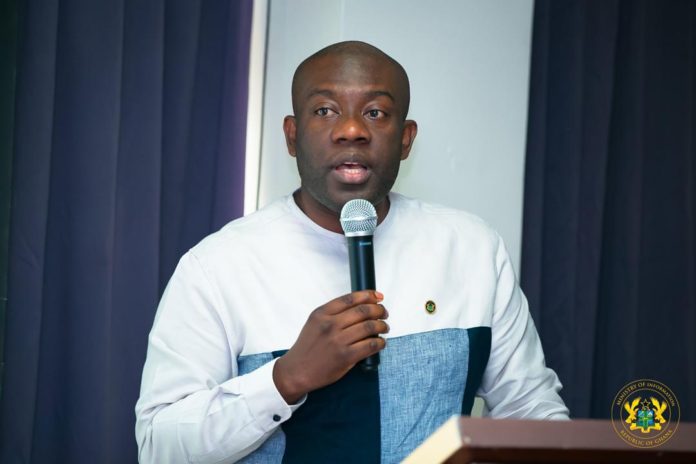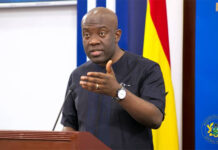
Kojo Oppong Nkrumah, Minister for Works and Housing, outlined the New Patriotic Party’s (NPP) ambitious “Bold Solutions” manifesto, focusing on a significant reduction in government expenditure to boost economic efficiency.
In a recent interview speaking with GHOne TV‘s Lantam Papanko on State Affairs show, Mr. Nkrumah emphasized a key strategy: cutting 3% of Ghana’s GDP from government spending, a move that would save the nation approximately GH₵30 billion.
“Dr. Bawumia has made a strong promise to re-evaluate the fiscal framework, which currently burdens the government with excessive expenditures,” Nkrumah stated. He explained that by reducing these expenditures, the government would lessen its need to raise revenues or borrow, thereby easing the financial strain on the economy. “One of the first steps Dr. Bawumia plans to take is to cut the expenditure framework by about 3% of GDP. That’s a GH₵30 billion expenditure cut,” he added.
When asked how the government would manage to fund its programs after reducing these expenditures, Nkrumah noted, “By cutting out unnecessary expenses, the government won’t need as much revenue or financing, which translates into lower debt levels.” He also mentioned that this approach would allow for the removal of certain taxes, as the revenue needs would be reduced.
“He’s introducing a new piece of legislation to limit revenue growth targets to no more than 105%, ensuring that we don’t overtax the people,” Mr. Nkrumah elaborated.
Mr. Papanko pressed further on which specific expenditures would be cut under this new fiscal policy. Nkrumah explained that certain infrastructure projects and selected goods and services could be shifted to the private sector. “We have identified several expenditure items that can be handed over to the private sector, similar to what’s done in countries like the U.S. and Kenya,” he remarked. He cited the example of Kenya’s new expressway from Jomo Kenyatta International Airport to Nairobi, constructed through public-private partnership (PPP) financing. “This model allows the private sector to fund and build infrastructure, while the government pays an amortized cost over time,” Mr. Nkrumah explained.
The NPP’s “Bold Solutions” manifesto appears to be centered around this fiscal re-engineering, aiming to create a more sustainable economic environment by easing the government’s financial load and encouraging private sector participation in national development.
Source: Ghana/Starrfm.com.gh/103.5FM/Mary Asantewaa Buabeng



